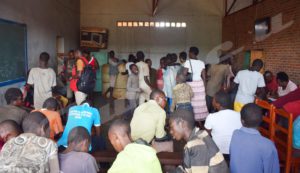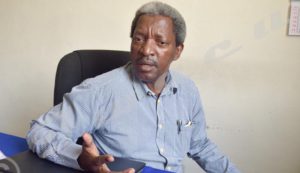The government has tried to take back street children into their families. What became of them after their return? Iwacu met these children who have failed to live in their families.

Street children in a reception center waiting to return to their families
Removing children from the street and sending them back home, a praiseworthy state project. G.N., aged 14, went back to her home in Muyira zone in Kanyosha commune. She was taken back to her family after a one-week stay in a host center of FVS Amade, a Burundian Association of Friends of Childhood.
She is the oldest of five children and an orphan. She worked as a street vendor in the city of Bujumbura in order to provide for her siblings. “Depending on the season, I sold mangoes, avocados or bananas,” she says, adding that her life and that of her siblings was going on well. She speaks about her former life with a sense of nostalgia.
“I never considered myself as a street child. I used to do small trade to keep my little brothers and sisters alive. I’m ready to go back to the street so that they can live, “says G.N with a bitter tone and a sad face.
She says that everything changed the day she found herself in a convoy to a reception center, during a round-up of street children.
At her home in Muyira, the girl is not happy. She says she is ready to go back to the street if she gets any opportunity. “In the city, I could make little money and satisfy the basic needs of my siblings”.
Since her return, her family’s life has turned into a nightmare. “I manage to do some small business, but it is not rewarding here at all.”
His paternal uncle, François Nyabenda, cannot help her and her little nephews and nieces. “I have to feed my own family. With this poverty, it’s really hard to take care of two families. She must manage herself”.
The uncle salutes the initiative of the state but finds that the government should help them after their return to their families. “Surely, these children were in danger in the street, but bringing them back home is not enough. There should be a follow-up and especially financial assistance to prevent them from returning to the streets”.
Mr. Nyabenda says some of these minor children, like his niece, are forced to take on responsibilities. The State should sensitize them to the importance of joining associations and assist them in the development of small income-generating activities.
An immediate return
E. N, 12, was recently brought back into his family. It is in Bwoga zone in Gitega province. The agent in charge of children reintegration in Gitega province thought he was still at school. “He was given uniforms and school supplies to go back to school,” says Niyakire Annonciate, a rehabilitation agent in Gitega Province Family Development Center.
It was during a visit to the boy’s family that the neighbors told her the child went back to the street a week ago. “He had all the school equipment and the uniform like others. But a week ago, he disappeared. We do not see him anymore”.
According to the neighbors, his parents quarrel every day and the boy had nothing to eat after school because his parents are irresponsible. “Maybe he could not resist his parents’ quarrelsome behavior any longer”.
It’s almost the same story for C.N, a young girl met in Bujumbura downtown. It is 6.30 p.m. in the city center, near the place commonly known as “Palais des Arts”. A young girl lugs small boxes that were used as packaging for beauty products. Carefree, she plays in the middle of the road, thanks to the red lights that prevent cars from crushing her.
The Stamm Foundation, a Burundian humanitarian organization that supports vulnerable people and children, helped her return to her family. This girl who was born in Bubanza province quickly returned to the street. “I could not stay at home while my dad did not give me food”.
She leads an unhappy life. She was born from a mentally-ill mother who wanted to kill her at birth but was saved thanks to a neighbor’s intervention. The latter carried her to an orphanage. At the age of 7, the orphanage wanted to hand her back to her family but her dad refused to take her saying she was not his child.
After a neighbor’s advice, her father came to pick her up. But the girl has no one to look after her. She spent her time wandering in her native village. She ended catching a truck which brought her to Bujumbura. “It was almost dark when I arrived in this city, and I soon became familiar with a group of girls I met here in the streets”.
For her, life in the street is better than what she experienced after being expelled from the orphanage. “Here, I beg and manage to get money to buy food while I could not find anything to eat at home “.
However, she admits that leading a street life is tough. “Sometimes we suffer sexual harassment. My two friends are already pregnant. My fellows also have problems when they have their periods due to the lack of sanitary towels “.
The girl admits that she does not see what the future holds for her, but resigns herself to living in the present and having fun as much as she can. “I live a lonely and miserable life because I have no other choice”.
“There should be a cautious preparation”

Joseph Ndayisaba: “They have nowhere to go except the street, their home”
According to Professor Joseph Ndayisaba, specialist in children education, the return to the street by these children was predictable. “What they ran away from their families still remains”.
This university professor says that many children flee the misery that prevails in their families. “According to a study conducted by students in 2014, street children flee hard life first. Some parents are not able to satisfy their children’s basic needs and even require them to provide for the family”.
According to him, there should be a careful preparation of host families so as to make a successful reintegration. “Removing a child from the street requires meticulous preparation to improve the situation s/he had fled”.
According to him, “a long-term plan should be developed to put an end to the street children phenomenon”.
Mr. Ndayisaba deplores the fact that children born in the streets are candidates for the street. They are not under any control. Neither parents nor anyone wants to take care of them. “They have nowhere else to go except in the streets. Their home finally remains the street”.
For him, there is always a challenge because the state is not able to take care of these children. “If the family is unable to take care of the child, the state should take over”. Nevertheless, this task is not easy, it is almost impossible in a society that has become money-based. “That’s why, despite the government efforts, we still see children in the street,” he concludes.



















 IWACU Open Data
IWACU Open Data

